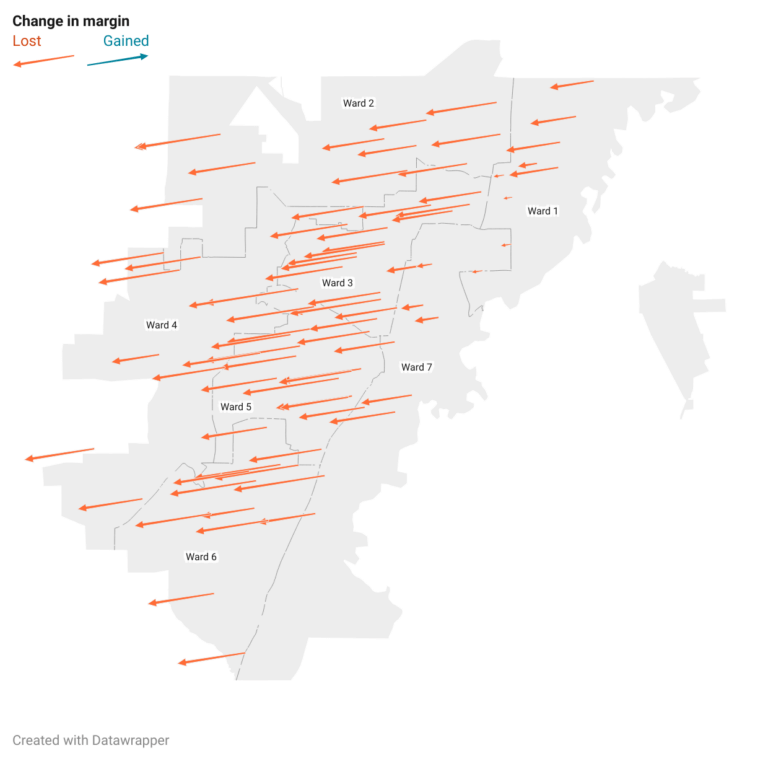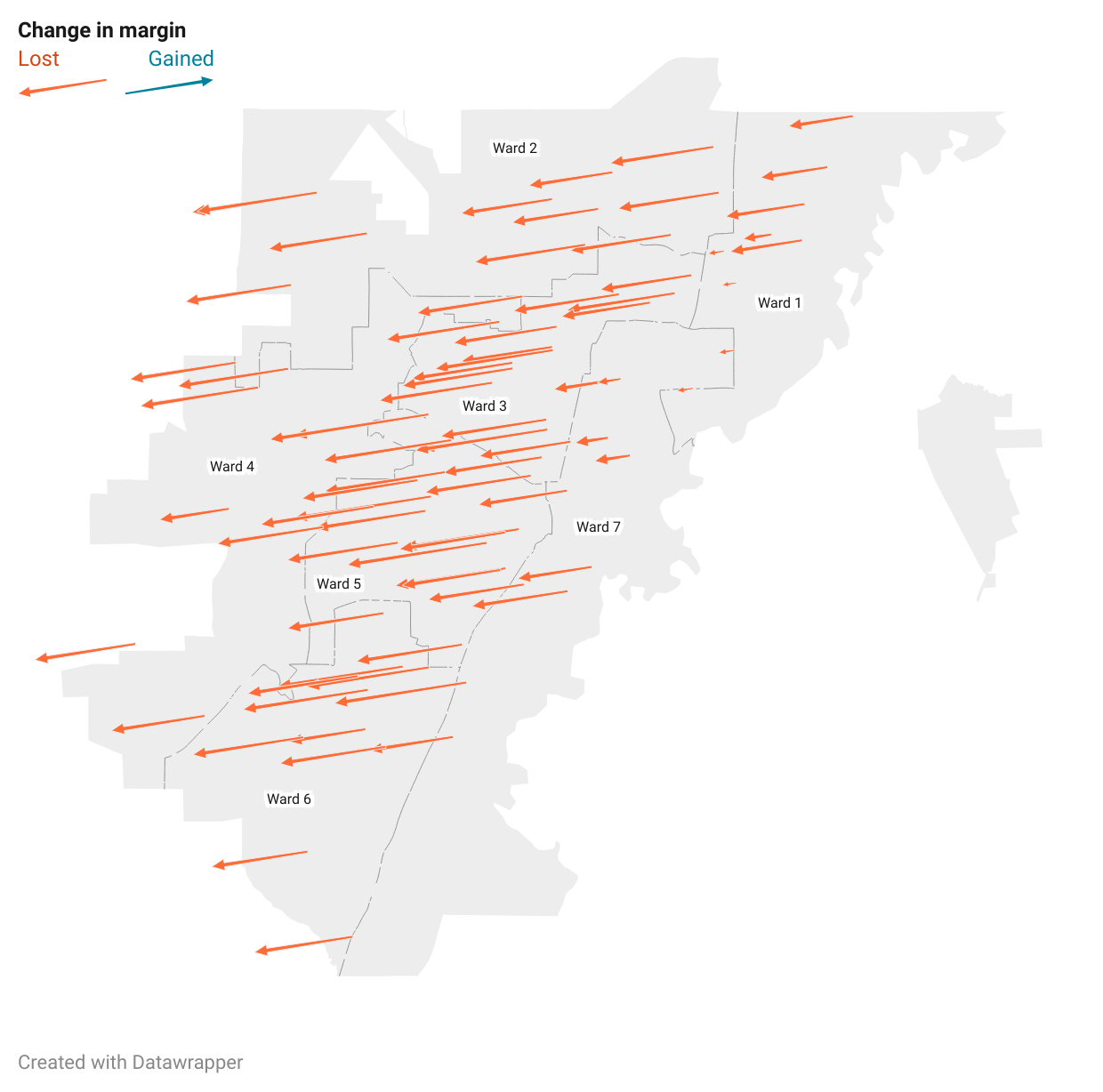

An analysis of the results in Jackson’s Democratic primary shows that Jacksonians all but flipped the script from 2017, the last time state Sen. John Horhn and Mayor Chokwe Antar Lumumba faced each other in a mayoral election.
Eight years ago, Lumumba won the Democratic primary outright, avoiding a runoff by securing 55% of the vote, winning a majority of precincts and taking home more than 18,000 votes.
But on April 1, his share of the citywide vote plummeted to 17%, and he received less than 4,300 votes, placing him second to Horhn. Lumumba led just two Jackson precincts — and even there, he got less votes than he did in 2017.
Meanwhile, Horhn bested Lumumba in Jackson’s remaining precincts, led in all seven wards, and more than doubled his share of the vote from 2017 when he came in second to Lumumba. This year, Horhn took home 48%, nearly enough to avoid the runoff scheduled for April 22.
For this analysis, Mississippi Today reviewed the final precinct returns which election officials completed late last week, and pulled unofficial returns for 2017 from the Hinds County Circuit Clerk, the only precinct-level results available for that election.
Brandon Jones, the director of political campaigns at the Southern Poverty Law Center, which has not participated in this year’s mayoral race, said Horhn’s margin showed a broad coalition of voters across the city supported him — a feat considering he faced nearly a dozen opponents.
“You don’t have to be a mathlete to appreciate that’s a pretty big frontrunner heading into the runoff,” Jones said.
This is especially notable because the timing of Mississippi’s municipal elections — what Jones calls “off off-year elections” — typically favor incumbents due to low turnout.
As one explanation for these shifts, Lumumba and his campaign have argued that Horhn was buoyed by strong support in Northeast Jackson’s Ward 1, where they say Republican voters crossed over to vote in the Democratic primary.
“That’s the grand majority of his votes,” Lumumba told Mississippi Today last week, before election officials completed the final returns.
In fact, Ward 1 made up just over a quarter of Horhn’s total votes. Precincts in that northeastern portion of the city comprised a smaller share of Horhn’s total support in the recent primary than they did in 2017.
And if Ward 1 was removed from the voter pool entirely, Horhn still would have taken home 44% of the vote, while Lumumba would have done just 2 points better.
Northeast Jackson is also where Lumumba lives, though his residence falls in a unique area covered by Ward 7. He votes at Fire Station #16, where he received just 9 votes.
“Jackson is a place where all of your assumptions are proven wrong on Election Day,” Jones said.
It is true that Ward 1 was Horhn’s strongest ward. His margins over Lumumba were the highest in the city’s northeast precincts.
And Lumumba’s support in Ward 1 declined from about a third in 2017 to just 10% in this year’s primary, though that’s primarily due to the mayor’s paltry showing in three of the ward’s nine precincts: Willie Morris Library, Spann Elementary School and Casey Elementary School, which are among the highest turnout precincts in the city.
At Casey, a polling place that sits across the street from his house, Lumumba did not receive a single vote.
But in more than half of Ward 1’s precincts, Lumumba’s support — between 14% and 19% — was on par with his citywide performance, where he averaged 18% per precinct.
Jones said these numbers reflect the fact that one candidate campaigned in Ward 1 and the other 11 candidates did not.
“As a person who is trying to parse the numbers and figure out what actually happened, I see a lot of competing narratives,” Jones said. “I don’t see a lot of competing data points.”
As anecdotal evidence of Republican cross-over, Lumumba pointed to an editorial in the Northside Sun encouraging Republicans to vote in the Democratic primary, as well as the fact that Ward 1 councilman Ashby Foote, the only Republican on the city council, forewent the primary by running as an independent this year.
As far as data, Lumumba said to look at the number of total votes in last year’s presidential Republican primary in Jackson compared to the number of total votes in the Republican primary in this year’s mayoral race.
If the votes decreased, Lumumba reasons that means Republicans are crossing over.
Out of nearly 5,300 votes for mayor in Ward 1 this year, just 149 were cast in the Republican primary. Back in March of 2024, about 1,300 Ward 1 residents voted in the Republican primary for president, according to data from the Mississippi Secretary of State’s office, compared to fewer than 1,200 Ward 1 residents who voted in the Democratic primary.
Ward 1’s reputation as a “Republican ward”, though, belies the results in the November general election, where Democratic candidate Kamala Harris beat Trump 3 to 2 out of nearly 10,000 votes in northeast Jackson.
And participation in municipal Republican primaries in Jackson, which do not produce a competitive candidate, is always much lower than in national elections. In 2017, just 83 people from Ward 1 cast a vote in the Republican primary for mayor.
Byron D’Andra Orey, a political science professor at Jackson State University, said this kind of data analysis comes with a caveat because there are multiple ways to view these results.
For one, it is difficult to compare behavior in national and municipal primary elections; Republican votes matter in the former but are virtually meaningless in the latter. Because Mississippi has open primaries, Orey said it is rational for voters of any political affiliation to cast a ballot in the Democratic primary, which has historically decided the city’s next mayor.
“We need to think about what does it mean to be in a Democratic primary when Republicans do not have the strength in numbers?” he said. “If we revisit that voter — that voter is actually a Democrat on that date.”
Horhn’s win was commanding. He was just 421 votes away from avoiding a runoff.
The senator even outperformed Lumumba in the five precincts where the mayor received the most votes in this election: Christ United Church in Ward 1, Timberlawn Elementary in Ward 4, and New Hope Baptist Church, Aldersgate United Methodist Church and Fire Station #26 in Ward 2.
The high-turnout precincts in Jackson’s northwestern Ward 2, where Horhn lives, voted in a way that most closely mirrors the overall electorate in the city. It’s also the area of the city Horhn serves in the Legislature and the ward Lumumba’s father Chokwe Lumumba Sr. represented on the City Council before he became mayor in 2013.
Even though it was the mayor’s strongest ward, Lumumba only received 22% of the vote there compared to Horhn’s 44%. In 2017, Lumumba received a whopping 62% of the Ward 2 vote, and Horhn got just 15%.
Still, Jones said any campaign is going to look at the data and try to find a silver lining or something to use against their opponent. But a candidate’s narrative does not change lived reality in the city: Decades of infrastructure problems, decreasing financial resources and an antagonistic state government.
Nor does it change that the mayor of Jackson may be the toughest job in the state.
“The truth is, this is a very embattled city, and the people pay the price for that,” Jones said.
The post How Lumumba faltered to Horhn: Jackson’s mayoral candidate rematch explained in 5 charts appeared first on Mississippi Today.
- Scott Colom raised most money, but Cindy Hyde-Smith has most cash before March primary - February 21, 2026
- Patients face canceled surgeries and delayed care amid UMMC cyberattack - February 20, 2026
- Goal is ‘better alignment, not bigger government’ for Mississippi tourism - February 20, 2026